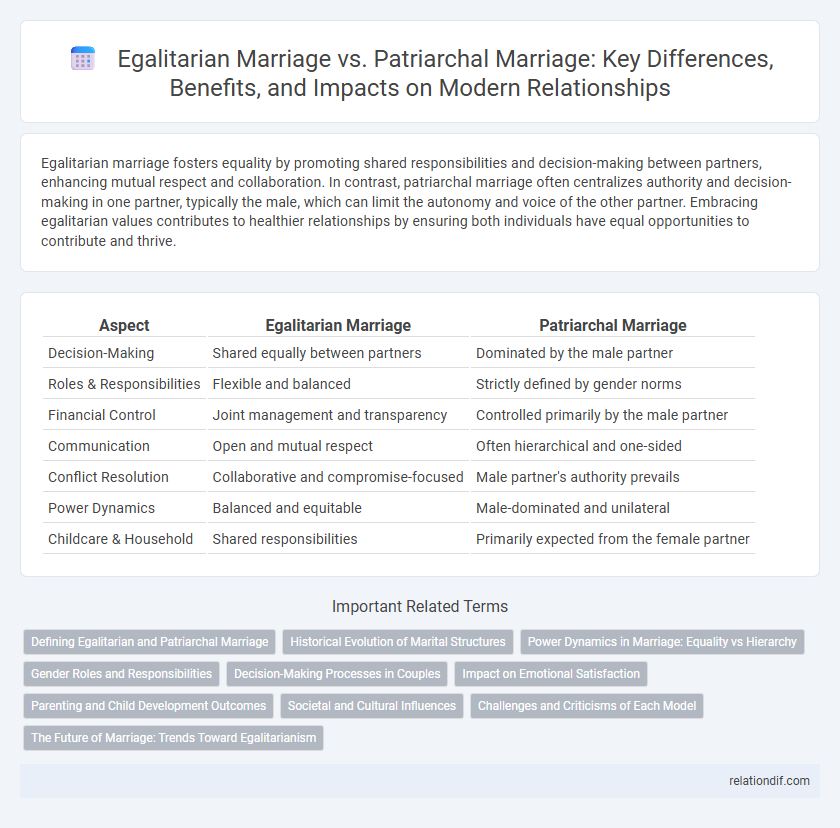Egalitarian marriage fosters equality by promoting shared responsibilities and decision-making between partners, enhancing mutual respect and collaboration. In contrast, patriarchal marriage often centralizes authority and decision-making in one partner, typically the male, which can limit the autonomy and voice of the other partner. Embracing egalitarian values contributes to healthier relationships by ensuring both individuals have equal opportunities to contribute and thrive.
Table of Comparison
| Aspect | Egalitarian Marriage | Patriarchal Marriage |
|---|---|---|
| Decision-Making | Shared equally between partners | Dominated by the male partner |
| Roles & Responsibilities | Flexible and balanced | Strictly defined by gender norms |
| Financial Control | Joint management and transparency | Controlled primarily by the male partner |
| Communication | Open and mutual respect | Often hierarchical and one-sided |
| Conflict Resolution | Collaborative and compromise-focused | Male partner's authority prevails |
| Power Dynamics | Balanced and equitable | Male-dominated and unilateral |
| Childcare & Household | Shared responsibilities | Primarily expected from the female partner |
Defining Egalitarian and Patriarchal Marriage
Egalitarian marriage is defined by equal decision-making power, shared responsibilities, and mutual respect between partners, promoting gender equality within the relationship. In contrast, patriarchal marriage assigns predominant authority and decision-making to the male partner, often reinforcing traditional gender roles and hierarchical structures. These foundational differences influence the dynamics, communication, and overall satisfaction experienced by couples in each marital framework.
Historical Evolution of Marital Structures
Historical evolution of marital structures reveals a shift from patriarchal marriage, characterized by male dominance and inheritance-based lineage, to egalitarian marriage marked by shared decision-making and gender equality. Patriarchal systems historically positioned men as heads of households with legal and economic control, reflecting broader societal hierarchies. Contemporary egalitarian marriages emphasize partnership and mutual respect, influenced by social reforms, feminist movements, and changing economic roles of spouses.
Power Dynamics in Marriage: Equality vs Hierarchy
Egalitarian marriages emphasize shared decision-making and balanced power dynamics, fostering mutual respect and partnership between spouses. In contrast, patriarchal marriages often concentrate authority within the husband's role, creating hierarchical structures where power is unevenly distributed. This divergence in power dynamics significantly influences communication patterns, conflict resolution, and overall marital satisfaction.
Gender Roles and Responsibilities
Egalitarian marriages promote equal sharing of gender roles and responsibilities, ensuring both partners contribute to household chores, childcare, and financial decisions without bias. Patriarchal marriages often assign traditional roles where men dominate decision-making and women primarily handle domestic duties, reinforcing gender-based power imbalances. Studies reveal that couples in egalitarian marriages report higher relationship satisfaction and equitable division of labor compared to those in patriarchal structures.
Decision-Making Processes in Couples
In egalitarian marriages, decision-making processes emphasize shared responsibility and mutual respect, where both partners actively collaborate and value each other's opinions equally. Patriarchal marriages often centralize authority with the male partner, leading to unilateral decisions that reflect traditional gender roles. Research shows that couples practicing egalitarian decision-making report higher relationship satisfaction and better conflict resolution outcomes.
Impact on Emotional Satisfaction
Egalitarian marriages, characterized by shared decision-making and equal distribution of domestic responsibilities, generally lead to higher emotional satisfaction for both partners due to mutual respect and support. In contrast, patriarchal marriages, where power dynamics favor one partner, often result in emotional dissatisfaction stemming from feelings of inequality and unmet emotional needs. Research indicates that couples in egalitarian marriages report greater intimacy, trust, and overall relationship happiness compared to those in traditional patriarchal setups.
Parenting and Child Development Outcomes
Egalitarian marriages, characterized by shared parenting responsibilities and decision-making, promote healthier child development outcomes, including higher self-esteem and better social skills. In contrast, patriarchal marriages often assign rigid parental roles that can limit emotional expression and reduce children's adaptive abilities. Research indicates children raised in egalitarian households exhibit improved cognitive and emotional development due to balanced parental involvement.
Societal and Cultural Influences
Egalitarian marriage models reflect increasing societal emphasis on gender equality and mutual respect, challenging traditional patriarchal norms deeply rooted in cultural histories. Patriarchal marriages prioritize male authority and decision-making, often influenced by longstanding cultural and religious practices that sustain gender hierarchies. Shifts toward egalitarian relationships correlate with broader social movements advocating women's rights, legislative reforms, and changing economic roles within families.
Challenges and Criticisms of Each Model
Egalitarian marriages often face challenges such as balancing dual career demands and navigating power sharing, which can lead to conflicts over decision-making and household responsibilities. Patriarchal marriages encounter criticisms for perpetuating gender inequality, limiting women's autonomy, and reinforcing traditional roles that may hinder personal growth and mutual respect. Both models struggle with societal expectations that influence relationship dynamics and individual satisfaction.
The Future of Marriage: Trends Toward Egalitarianism
Egalitarian marriage, characterized by equal decision-making and shared domestic responsibilities, increasingly replaces traditional patriarchal marriage models dominated by male authority. Recent studies reveal a growing preference among younger couples for partnerships rooted in gender equality, reflecting broader social shifts toward inclusivity and mutual respect. This trend signals a transformative future for marriage, emphasizing collaboration, emotional intimacy, and balanced power dynamics.
egalitarian marriage vs patriarchal marriage Infographic

 relationdif.com
relationdif.com